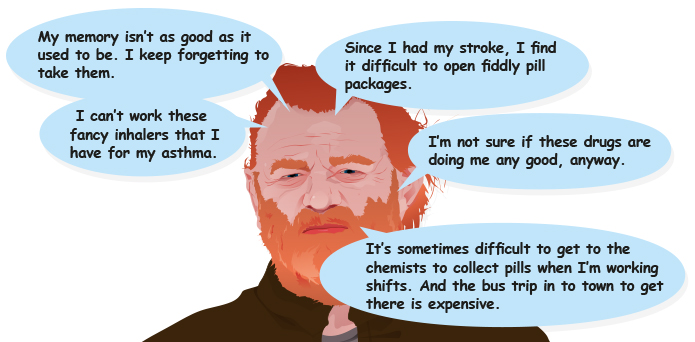Sandy’s GP arranges for him to meet with the Heart Failure Nurse at the health centre. One of the main issues that individuals with multiple conditions often encounter is polypharmacy. Sandy is on a range of medications for his different conditions. The Heart Failure Nurse has three main questions she wants to ask Sandy:
- what medication is he currently on?
- is he taking his medication?
- how can he be supported to adhere to his drug regime?
Please enable JavaScript in your browser to see this interactive content.
Is Sandy taking his medication?
Sandy admits to the heart failure nurse that he hasn’t been taking his medications as prescribed.

How can Sandy be supported to adhere to his drug regime?
The heart failure nurse explains to Sandy what each drug is for and reinforces the importance of taking them regularly. She notes down a number of actions that may improve Sandy’s concordance. (For further information on concordance, please see Additional Information, below.
Sandy and the Heart Failure Nurse also discuss potential health behaviour changes that he might like to consider.
Please enable JavaScript in your browser to see this interactive content.
Which medication do you think Sandy is currently on?
Bispoprolol?
No – Beta-blockers can precipitate asthma and should be avoided in patients with history of asthma.
Furosemide?
Yes – Sandy has a degree of pulmonary oedema, and diuretic therapy will help alleviate his symptoms
Digoxin?
Maybe – As Sandy is unable to take a beta-blocker, digoxin therapy may be considered, to help control his ventricular rate.
Enalapril?
Yes – ACE inhibitors are used in all grades of heart failure. Enalapril lessens the symptoms of heart failure in patients with LVSD.
Spironolactone?
Maybe – If Sandy has ongoing symptoms, despite beta-blocker and ACE inhibitor, a low-dose mineralocorticoid receptor agonist (MRA) might be prescribed. Spironolactone can have beneficial effects on the heart and reduce mortality, even if a patient is not fluid-overloaded.
Clopidogrel?
No – Sandy would not be prescribed Clopidogrel unless he had a previous history of myocardial infarction or angina.
Diltiazem?
Maybe – Diltiazem and other calcium-channel blockers can be used with caution in heart failure patients, and only under specialist care, as they may depress cardiac function.
Salbutamol inhaler?
Yes – Sandy should use a salbumatol inhaler to relieve his asthmatic symptoms.
Becotide inhaler?
Yes – Inhaled corticosteroids are recommended for prophylactic treatment of asthma.
Omeprazole?
No – Omeprazole decreases the action of clopidogrel and may increase the risk of a myocardial event.
Simvastatin?
Yes – Sandy has had a previous stroke and is at higher risk of a further event.
Metformin?
Yes – Metformin is a type-2 diabetes drug that will help lower Sandy’s blood sugar to a normal level.
Warfarin?
Yes – Warfarin is mandatory therapy for individuals with atrial fibrillation, due to the increased risk of a stroke occurring.
Sandy’s admissions
- My memory isn’t as good as it used to be. I keep forgetting to take them.
- I can’t work these fancy inhalers that I have for my asthma.
- Since I had my stroke, I find it difficult to open fiddly pill packages.
- I’m not sure if these drugs are doing me any good anyway.
- It’s sometimes difficult to get to the chemists to collect pills when I’m working shifts. And the bus trip into town to get there is expensive.
Sandy’s list of actions
1. Contact pharmacist to organise for Sandy’s drugs to be dispensed in weekly Venalink (dosette) pack, 2 month supply at time.
Venalink is a system that repackages medications in a special weekly tablet organiser. This should make it easier for Sandy to remember his tablets and to access them. He will not have to pay to go into the nearest town or take time off work so frequently to collect them.
2. Contact diabetic specialist nurse re meeting with Sandy to discuss the importance of medications, diet and self-monitoring.
3. Contact asthma nurse regarding inhaler education sessions.
The asthma nurse will re-educate Sandy around his inhaler technique and arrange for him to be seen regularly at the asthma clinic. She also suggest that Sandy might like to have a look at the My Lungs, My Life website.
4. Organise for Sandy to have access to the Florence app.
Florence is a mobile phone app. that allows personalised text reminders and monitoring for each individual patent. It can encourage self management and promote adherence to health regimes.
Page last reviewed: 26 Sep 2020


